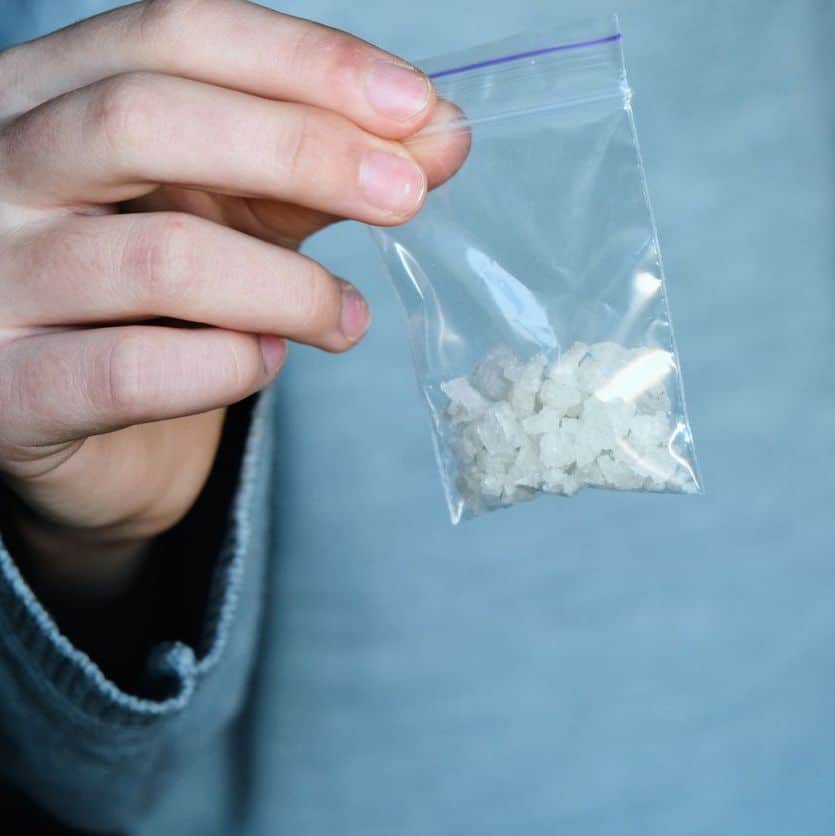Possession of cocaine or a narcotic drug in Indiana is a felony, and your freedom and future are at risk. Never be without an experienced criminal defense team to defend your rights. Gemma & Karimi are ex-prosecutors and highly skilled criminal defense lawyers who know how to scrutinize evidence, negotiate with prosecutors, and win complex cases in court. Talk to an experienced Indiana cocaine possession lawyer today in a free consultation at (317) 602-5970.
What Is Possession of a Controlled Substance?
In Indiana, possession of a cocaine or a controlled substance refers to having physical control or custody of a drug or substance classified under the state’s controlled substance schedules without a valid prescription or legal authorization.
This includes illegal drugs like cocaine, heroin, methamphetamine, and marijuana, as well as certain prescription medications like opioids or benzodiazepines if you don’t have a doctor’s script. The law is stated in Indiana Code 35-48-4.

Controlled Substances in 5 Schedules
Controlled substances in Indiana are grouped into five schedules based on their medical use and potential for abuse. Schedule I, such as heroin, has no accepted medical use and high abuse risk. Schedule II, such as cocaine, meth, and oxycodone, has medical uses but still carries significant addiction potential.
Schedules III through V, such as anabolic steroids, codeine cough syrups, decrease in risk but remain regulated. Possession of any of these without permission is illegal, though penalties vary.
Basic Possession Of Cocaine Charge Usually a Level 6 Felony
For a basic possession charge, say, a small amount of cocaine, it’s typically a Level 6 felony. That carries up to 2.5 years in prison, a fine up to $10,000, or both, though first-timers might see probation instead.
If it’s less than 5 grams of marijuana, it’s usually a Class B misdemeanor: up to 180 days in jail and a $1,000 fine. But the stakes rise if there are more drugs involved Possessing with intent to deliver based on quantity, packaging, or other evidence, or having a large amount, like 28+ grams of a Schedule I or II drug, can bump it to a Level 5 felony or higher, with 1-6 years in prison and fines up to $10,000.
Enhancements Take Effect In Aggravating Circumstances
Enhancements kick in under specific conditions. Possession near a school, park, or public housing within 500 feet of kids, or 1,000 feet if you have a gun, adds a felony level. Prior convictions can too, if you’ve got a drug-related record, a Level 6 felony might climb to a Level 5. And if you’re caught with a firearm alongside the drugs, prosecutors can push harder.
What Is Possession?
What counts as “possession”? It’s not just holding it in your hand. Indiana recognizes “actual possession,” on your person, and “constructive possession,” which means you control it, like drugs in your car or house. Prosecutors don’t need to catch you red-handed; they can infer intent from where it’s found and whether you had access. Shared spaces like a car can complicate things, but if it’s in your pocket or glovebox, they’ll pin it on you unless you prove otherwise. An experienced drug possession defense attorney may argue whether you had actual or constructive possession of the cocaine or other drugs.

Facing criminal charges in Indianapolis?
Call our Indiana Criminal Defense attorney at (317) 676-4747 or fill out our online contact form today to schedule a free consultation!
Indiana Laws and Penalties for Possession of a Narcotic Drug
In Indiana, possession of a narcotic drug falls under the state’s controlled substance laws. Narcotics are usually cocaine, heroin, methamphetamine, and opium. Penalties for drug possession charges depend on the type of drug, amount, your criminal record, and circumstances:
Basic Possession
Indiana Code 35-48-4-6 covers possession of a narcotic drug without a valid prescription. This applies to cocaine, heroin, or Schedule I/II narcotic prescriptions not legally yours.
- Level 6 Felony: Up to 2.5 years in prison, fines up to $10,000, or both. Minimum is 6 months if jail time is imposed.
- Class A Misdemeanor: If it’s a first offense, a small amount, and there are no aggravating factors, it could be reduced to up to one year in jail and a $5,000 fine. Prosecutors or courts might offer this via a plea or discretion.
Aggravating Factors
Penalties escalate if certain conditions apply in your possession of cocaine case:
Amount
- Less than 5 grams of cocaine or narcotic drug, without intent to deliver: Stays a Level 6 felony.
- 5-10 grams with “enhancing circumstances,” such as prior conviction, gun involved: Jumps to a Level 5 felony, 1-6 years in prison, fines up to $10,000.
- 10-28 grams with enhancers: Level 4 felony, 2-12 years, up to $10,000.
- 28+ grams with enhancers: Level 3 felony, 3-16 years, up to $10,000.
- Location: Possession within 500 feet of a school, park, family housing complex, or youth center, when kids are present, increases the felony level by one. If you’re armed, the radius extends to 1,000 feet.
- Prior Drug Convictions: A previous drug-related conviction (felony or misdemeanor) can elevate the charge one level. For example, a Level 6 becomes a Level 5.
- Firearm: Possessing a gun during the offense often triggers an enhancement, pushing the felony level up and adding a separate weapons charge risk.
Prescription Narcotics
- If it’s a Schedule II narcotic like oxycodone or morphine, possession without a valid prescription is still a Level 6 felony under IC 35-48-4-6. The same enhancements apply. Having a script, or proving it’s legally yours, can dismiss case, but expired or borrowed prescriptions won’t cut it.
- Possession of cocaine or a narcotic drug is a Level 6 felony in Indiana, punishable by up to 2.5 years in prison and fines up to $10,000.Our Indianapolis criminal defense lawyers will provide the best legal defense and will help you understand the complex penalties and laws for possessing cocaine and other narcotics.
Defenses and Strategies for Accused of Possession
Defending against a possession of cocaine charge in Indiana requires your criminal defense lawyer to take apart the prosecution’s case, or use legal facts and arguments to dismiss or reduce your charge. The strategies depend on the specifics, such as what drug, how much, where it was found, and how police got involved. Here’s several defenses your attorney may use for a possession of cocaine charge:
Challenging the Stop or Search
The Fourth Amendment protects against unreasonable searches and seizures, and Indiana courts enforce it strictly. If police lacked reasonable suspicion to stop you or probable cause for a search, evidence like the drugs could be suppressed.
For example, the find might not hold up if an officer searched your car without a warrant or valid exception, like plain view or a lawful arrest. Your attorney can file a motion to suppress, arguing that the stop or search was illegal. No evidence, no conviction for possession of cocaine.
Questioning Possession
Prosecutors must prove the drugs were yours, either through “actual possession” or “constructive possession”. If the drugs were in a shared space, like a car with passengers or a house you don’t own, you can argue they belonged to someone else.
Courts look at factors like proximity, access, and your behavior. Were the drugs in a roommate’s locked room? A passenger’s bag? Were they in the glove box? The state’s case weakens if there’s no fingerprint, DNA, or witness tying you to them, and you didn’t admit ownership. “Mere presence” near drugs isn’t enough to convict you under state law.
Attacking Evidence Handling
Chain of custody matters. If police mishandled the drugs, say, they weren’t properly sealed, labeled, or stored, your attorney can question whether the substance tested is what they claim they found. Lab errors happen, too; uncalibrated equipment or sloppy procedures can skew results.
For prescription drugs, showing a valid script can negate illegality. If it’s marijuana, you might argue it’s hemp, forcing the state to prove otherwise with lab data they might not have.
Lack of Knowledge or Intent
You can argue you didn’t know the drugs were there. Maybe a friend left a baggie in your SUV, or someone slipped pills into your bag. It’s more challenging with large amounts or paraphernalia, as courts infer intent, but for small quantities, ignorance can be believed in some cases, especially with no prior record.
Consequences of Illegal Possession of a Controlled Substance
In Indiana, the consequences of illegal possession of a controlled substance ripple through your life, legal, financial, and personal. Here is what could happen in your case:
Jail Or Prison Time Likely
Legally, penalties scale by offense level. Simple possession of a Schedule I or II drug, such as cocaine, is a Level 6 felony: up to 2.5 years in prison, fines up to $10,000, or both. First-timers might get probation, but the court can still lock you up for 6 months.
Marijuana under 5 grams is a Class B misdemeanor, up to 180 days in jail and a $1,000 fine—but anything over 30 grams or with priors jumps to a felony. More significant amounts of drugs (28+ grams of hard drugs) or intent to deal can lead to Level 5 felony status: 1-6 years and a $10,000 max fine.
Enhancements pile on near schools, parks, or with a gun, add a felony level, meaning more time, up to 12 years for a Level 4 felony, and heftier fines.
Driver’s License Suspension
Your driver’s license will probably be gone, too. Indiana’s Bureau of Motor Vehicles can suspend it for 6 months to 2 years, even without a driving-related offense, under IC 9-30-13-3. Refuse a drug test during a stop? That’s a separate 180-day to 2-year suspension under implied consent laws. You can beg for a hardship license, but only for school or work, but it’s not guaranteed and costs extra fees.
It sounds terrible, but a skilled Indiana drug possession lawyer handles cases like yours daily. A favorable outcome is possible with your Indiana drug possession attorney.
What to Do If You’re Accused of Possession
You were arrested for possession of cocaine, and you face years in jail. What should you do? First, do not talk to the police, other than to provide information about your name and address. Immediately retain a skilled criminal defense lawyer to fight your possession of cocaine charge, or whatever the drug involved. Our criminal defense lawyers have 25 years of criminal defense experience in controlled substance possession and trafficking cases. They can help immediately if you’re charged with drug possession, including possession of drug paraphernalia, or possession of methamphetamine.
Gemma & Karimi were prosecutors and now top-rated criminal defense lawyers. We know both sides of the criminal justice system, including what prosecutors need to prove their case. When you hire us, you will have 24/7 access to our cell phones and always have us close by. Contact our possession of cocaine or a narcotic drug lawyer in Indiana for a free consultation at (317) 602-5970.


Contact Our Firm
Cras dapibus. Vivamus quis mi. In consectetuer turpis ut velit. Praesent blandit laoreet nibh. Nullam nulla eros, ultricies sit amet, nonummy id, imperdiet feugiat, pede.
